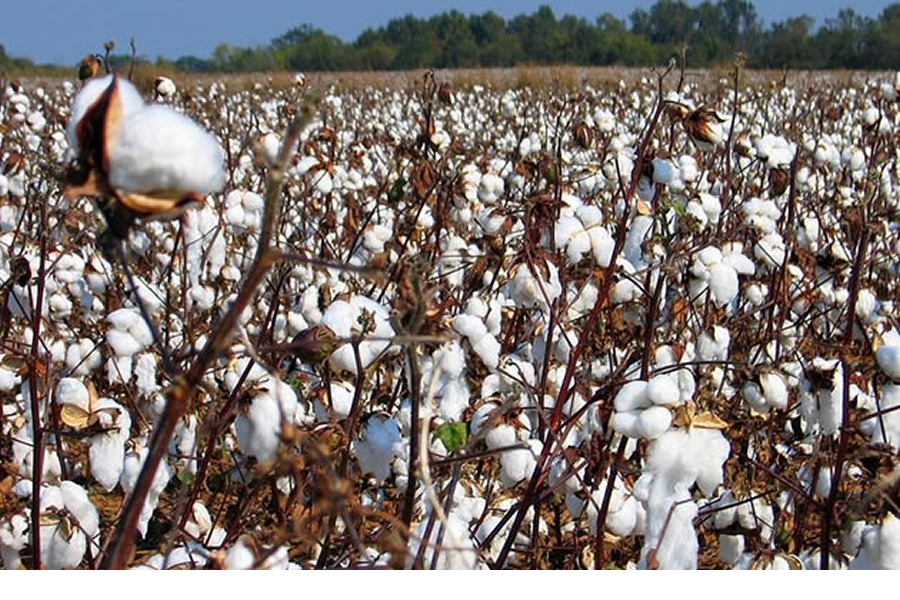
Ghana has suspended trials of genetically engineered Bt cotton after Monsanto withdrew funding, scientists working on the project have said.
The trials being undertaken by scientists at the Council for Scientific and Industrial Research (CSIR), a government research agency, are regulatory requirements before the GMO cotton can be commercialized in Ghana. The development means there will be no GMO cotton for farmers to make use of anytime soon.
Work on the project froze in 2016, but Dr. Emmanuel Chamba, a researcher at the Savaanah Agric Research Institute (SARI) of the CSIR and principal investigator on the project, says it s now been officially suspended.
After two years of the on-station confined field trials, the next step was to go to the farmers field, after which we will be thinking of commercial release, Chamba explained. Unfortunately, because of the situation in Burkina Faso, Monsanto pulled out. And because Monsanto was funding the [Burkina Faso] program, they suspended it in Ghana also.
Bt cotton has been engineered to naturally resist attacks by the bollworm insect and other pests. The Ghana trials began in 2012 and were supposed to last for about six years before the cotton could get to the market.
The trials had proved promising as less pesticide were used on Bt cotton fields in the Northern Region, compared to conventionally produced ones. While cotton farmers growing conventional varieties have to spray fields up to six times within the crop s life cycle, only two cycles of spray were needed on the test GMO fields, as the seeds had built-in resistance to the pests.
Dr. Chamba is worried farmers will not get the benefit of growing GMO seeds unless the project resumes soon. At the moment, we are going back to the conventional variety. Where they have to be spraying (pesticides) several times. Nobody wants to spray so many times. But because we have not concluded the experiment, farmers cannot grow that variety, Dr. Chamba lamented.
Dr. Chamba however says they are not giving up. They are looking for fresh donor support to resume the trials in Ghana for the benefit of farmers. If we can get money from any other place to finish the trail, we welcome it and finish the trials, he stated.
Patrick Apullah, vice chairman of the Cotton Farmers Association of Ghana, is asking the government to step in. He says farmers are eager to have the GMO cotton seeds in their hands and government should not disappoint them.
We the farmers of cotton are calling for the immediate introduction of Bt cotton in the country, he said. There is nothing wrong with Bt cotton. There is nothing wrong with Bt products. Bt cotton has come to stay. Our government of the day should have a look at it and support the development of the Bt cotton.
Bt cotton was made available to farmers in Burkina Faso in 2010, and by 2013 some 70 percent of all cotton grown in that country was GMO. But concerns arose that fiber produced from the GMO cotton was shorter than conventional varieties. The length of the fiber is crucial because the longer ones allow for several spinning rounds, thereby producing better quality textiles.
The shorter fibre resulting from GMO cotton drew protests from cotton companies in Burkina Faso, resulting in a decision in 2015 for a phased withdrawal of the GMO variety. The cotton companies accused Monsanto of deceit and made a formal request demanding $100 million in compensation. Edwin Baffuor of Food Sovereignty Ghana believes this is a lesson for Ghana not to adopt the technology.
The Burkina case shows clearly that some of the expected outcomes as promised the farmers won t be realized, Baffour explained in an interview. And this is part of the red flag that we have been raising for a while now. And it can t be closer to home than this. The outcomes of GMOs are unknown in the long term.
Food Sovereignty Ghana is not the first organization to raise this red flag. Matthew A. Schnurr, associate professor at the Department of International Development Studies at Dalhousie University in Canada, has done extensive research on the impact of GMO crops on African economies and issued a similar caution in the past.
One outcome of Burkina Faso s reversal is the complicating of the image of GM crops as precise and universally beneficial These problems with poor quality lint resulted from the introgression of the Bt trait into the local variety, he said. If Ghana is planning on replicating this same process, they might risk producing similar results. I am skeptical that GM cotton or maize will offer benefits to small scale African farmers.
But Dr. Edgar Traore, a plant breeder with Burkina Faso s National Research Institute (Institute de l Environnement et de Recherches Agricoles – INERA) insists the technology did not fail his people. He says work is ongoing to correct the errors that resulted in the poor fiber quality and get the GMO cotton back on the market.
The technology is good, but the technology met a technical problem that has a solution, he explained. So even the association which was behind the decision to go back to commercial [is] still waiting for better varieties with longer fiber so they can go back to GMOs.
